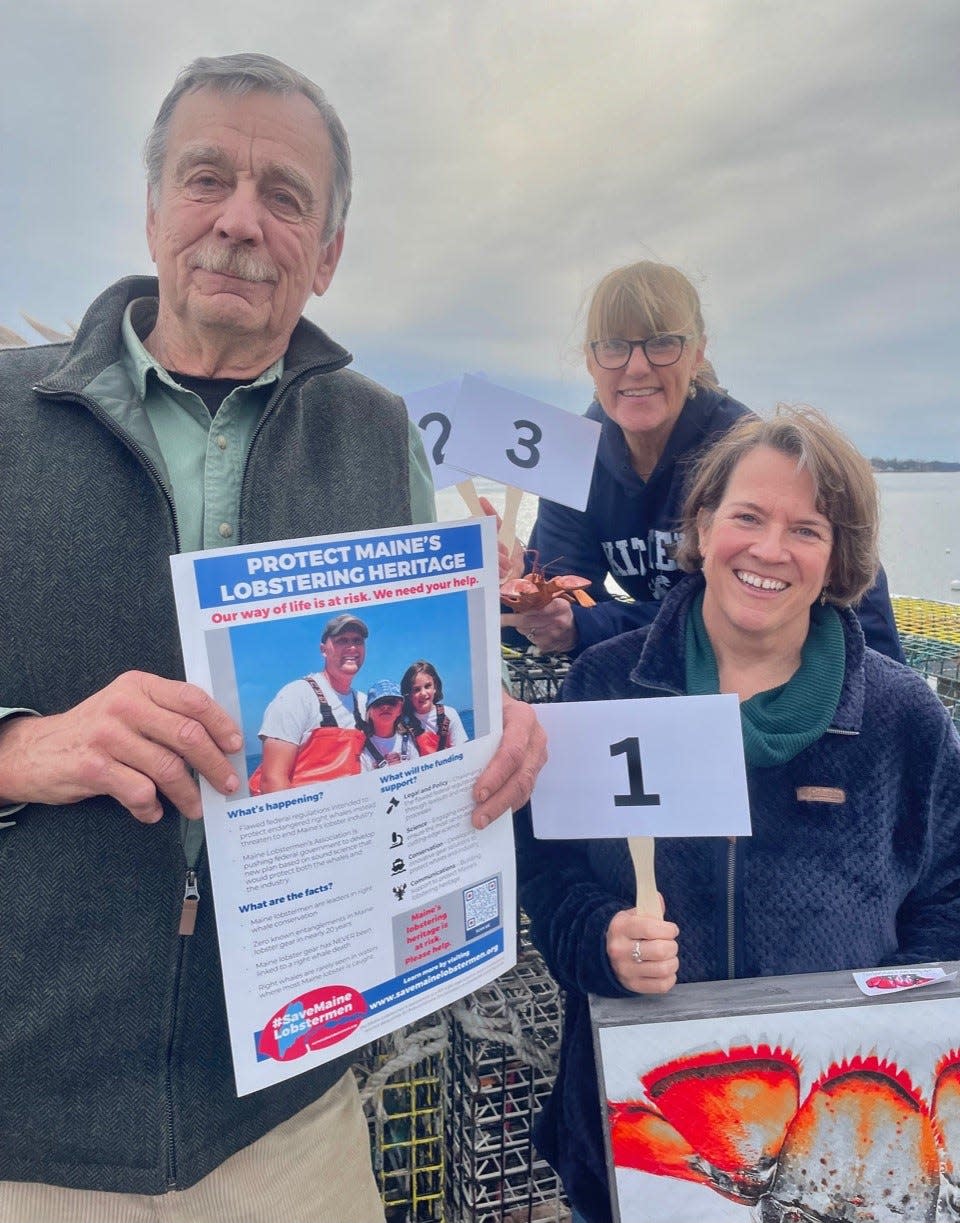Kerr: Maine’s oldest town rallying around state’s lobster industry
KITTERY, Maine — As Maine’s iconic lobster industry faces challenges to its very survival, the state’s oldest town is rallying behind the men and women fighting for their livelihood.
A fundraising event called “Chowder’s On,” organized by three local residents, is taking place Feb. 26 at the Kittery Community Center. While tickets to the lobster stew luncheon have already sold out, both live and silent auctions will take place afterward in the center’s Star Theatre starting at 1 p.m.

Proceeds from the event will go toward legal challenges of federal regulations intended to protect the North Atlantic right whale, which the industry says instead endangers lobstermen already taking historic measures to accomplish the same goal.
Recent efforts by the state’s small but formidable congressional delegation and Gov. Janet Mills resulted in a six-year hold on new rules to allow time for new research to be considered. These changes had caused two environmental groups to downgrade the industry’s rating as a protector of right whales, which in turn resulted in the Whole Foods supermarket chain’s decision to stop carrying Maine lobsters.

More:Maine lawmakers target Whole Foods for blacklisting lobster
All this despite the fact that no death of a right whale has ever been attributed to the state’s lobster fleet.
“This is one of the most perilous moments ever faced by Maine’s lobster industry,” Kevin Kelley of the Maine Lobsterman’s Association said recently, “but the six-year regulatory pause gives the industry a little bit of time and some hope that whatever rules are implemented by the federal government make sense.”
A call for using 'real data' to set policy on lobster
The Feb. 26 event is being organized by Kittery residents David Kaselauskas, a lobsterman for more than half a century; Charlene Hoyt, the mother and wife of local lobstermen; and Betsy Wish, a local artist whose affinity for lobstermen is so renowned it’s being featured in a March 1 segment on New Hampshire Public Television.
Kaselauskas, who has a master’s degree in microbiology from the University of New Hampshire, emphasizes “real data” has to be collected in order to put together regulations which will not only protect the right whale but also preserve the lobster industry. Current legislation does neither, he says.
But he also wants to make sure Mainers truly understand the commercial fishery’s impact on the state’s way of life.
“The further we travel towards Eastport the greater the reliance there is on the lobster industry,” he said recently. “Ghost towns will be popping up along the coast with the collapse of the lobster industry.”
Kaselauskas likes to point out that manufacturers of rope, special break-away links, buoys and buoy sticks, lobster trap wire and other components, bricks and netting all rely on the harvesters of Homarus Americanus. Traps cost anywhere between $100 and $175, he noted, so someone purchasing 800 traps is spending at least $80,000, plus roughly $15,000 for lines and buoys.
In addition, those who fish for the bait used in these traps make up “a large industry in itself, millions earned,” he added. But getting bait to the boats requires transportation, dealers, waterfront facilities which generate revenue for the town, refrigeration, salt, barrels, insurance, maintenance and “labor and more labor.”
Portsmouth Naval Shipyard:Base seeks 1,200 more workers, offers $5,000 bonus. How to apply.
“What is involved in the lobster industry is more than a guy and boat,” said Kaselauskas, who skippers the vessel Jersey Girl.
But that’s worth considering as well. Any action which diminishes the lobster fleet also impacts those who build the boats, he says, as well as those who operate boatyards where the boats are maintained, the marinas and moorings where the boats may tie up, those who fuel the boats and insure the boats and serve as the boats’ crew and so forth.
“Hopefully we catch a lobster and sell it to a dealer,” he continued, “who in turn can sell it to another dealer; sell it to a fish market; sell it to a restaurant; sell it to a processor; sell it to a foreign country.”
Again, this all requires transportation, either by road, rail or plane, Kaselauskas noted, as well as facilities and maintenance, including backup systems for potential power failures to ensure against the loss of thousands of dollars of live lobsters kept in tanks.
And this doesn’t even take into account the boon in tourism from out-of-state visitors enthralled with the storied image of the Maine lobsterman, he added.
Lobster industry's massive impact on Maine economy
An economic impact report issued by Colby College in 2018 indicated that the lobster industry contributes $1 billion to the Maine economy each year, supporting 4,000 jobs, not including the link to local restaurants and tourism. And that’s before the value of 2021’s harvest shattered records by a whopping 75 percent increase over the previous year.
More than 80% of America’s lobsters are caught in Maine.
So it was quite a slap in the face last year when Monterey Bay Aquarium's Seafood Watch in California and the London-based Marine Stewardship Council both “red-listed” their environmental ratings for the fishery.
Kelley, as director of advancement for the MLA, heads the organization’s fundraising efforts, and especially for the Save Maine Lobstermen campaign. The group’s mission is to make sure “the rules are based on sound science and will actually protect the endangered whale without decimating this heritage industry,” he said.
What to expect at Kittery fundraiser
The “Chowder’s On” luncheon will include lobster stew made by Betsy Wish from lobsters donated by five local dealers (54 pounds of meat valued at $2,700); clam chowder created by Charlene Hoyt from a family recipe and with clams collected by her husband and son; and various homemade pies. Hannaford Supermarket in York donated $300 toward ingredients for both the stew and the chowder.
The 100 tickets available for the community center feast sold out quickly, but those wishing to support Maine’s lobstermen can take part in the live and silent auctions being held afterward. Lil’s Café is providing coffee and pastries in the center’s Morgan Gallery for the event.
Auction items include a Pepperrell Cove lobstering adventure aboard Charlene’s husband Scott Hoyt’s boat Slow Mocean, a Lost Charter tuna cruise, Bar Harbor Hotel overnight stay and dinner, four Portsmouth Music Hall tickets for comedian Justin McKinney, a Wood Island tour, ten lobsters donated by Island Seafood, a Webber Spirit 2 Gas Grill provided by Kittery’s Ace Hardware, Portland Sea Dogs tickets, a Take Flight aerial adventure course, Woodland Farms beer basket and numerous other items.
Gift certificates have been donated from Kittery Trading Post, Rudders Public House, Perkins Cove Candies, Buoy Shack, New England Marine & Industrial, Blue Mermaid, Sanders Fish Market, Tributary Brewing Company, York River Landing, Weathervane Restaurant and Pepperrell Cove Restaurant, among others.
Wish is known locally as the “kayaker with cookies,” a retired Massachusetts art teacher who routinely paddles in local waters with her canine companion Maggie and delivers homemade cookies to lobstermen and others she encounters. An upcoming episode of NHPTV’s “Windows to the Wild” filmed last summer follows her exploits and includes interviews with local lobstermen.
Last year, Wish released a cookbook entitled “Kittery’s Maine Ingredients” to commemorate the 375th birthday of the state’s oldest town. The volume includes photos, family anecdotes and lots of local history, as well as recipes dating back to the 1600s.
“Our goal is to raise awareness for the challenges facing our lobster/fishing community while raising money for the Maine Lobstermen’s Association,” she said of the Feb. 26 fundraiser.
Kaselauskas believes more empirical data needs to be collected in order to provide a clear picture of the right whale’s migration patterns. Industry leaders believe this is the actual reason for the creature’s diminished population in this region.
Kelley says rules intended by the U.S. government to reduce risks to the right whale by 60% were implemented last May. The recent hold on enforcement allows time for the industry to gather such information.
“Those rules remain in place under Congress’ action, it just prevents the government from imposing the harsher rules it was considering until at least December 2028,” he said.
People wishing to learn more about the effort, or to donate, may do so at Save Maine Lobstermen.
D. Allan Kerr is an ex-dockworker, former newspaperman and U.S. Navy veteran living in Kittery, Maine.
This article originally appeared on Portsmouth Herald: Kerr: Kittery, Maine rallies for lobster industry

